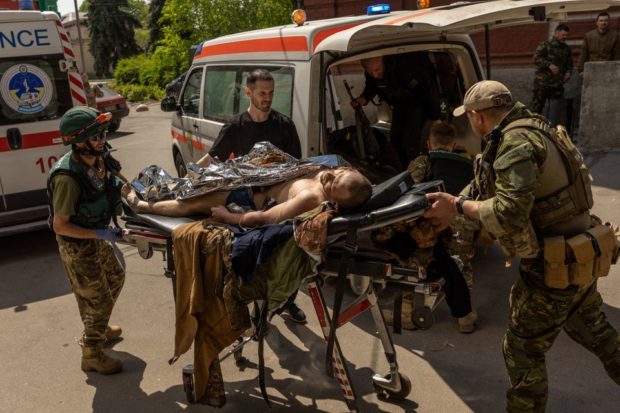
Paramedics from the Pirogov First Volunteer Mobile Hospital move an injured Ukrainian solider, who was evacuated from the front line in Popasna, from an ambulance, amid Russia’s invasion in Ukraine, outside a hospital in Bakhmut, Donetsk region, Ukraine, May 5, 2022. The soldier had suffered a shrapnel injury to his spine. The doctors say his life is not at risk, but he may lose the use of his arms and legs. REUTERS
BAKHMUT, Ukraine — The hospital in the small Ukrainian town of Bakhmut was never intended to receive queues of ambulances bringing the wounded and traumatized from the front line of Europe’s biggest battlefield.
Nor did the volunteer paramedics expect, four months ago, to be shuttling back and forth to the front line of a brutal tank battle, within earshot of rockets and shelling.
“I haven’t seen so much human tragedy before. Absolutely unnecessary suffering,” said Elena Bulakhtina, a Russian-born Canadian medic who joined the Pirogov First Volunteer Mobile Hospital, a group of paramedics dedicated to providing medical care on the front line.
The hospital’s main job now is to “stabilise” the injured from the battle zone around the town of Popasna in the Luhansk region so that they can be moved on to bigger hospitals in western Ukraine, farther from the main battle.
“Any Russian who can do something concrete to help Ukraine, not just sit on Facebook … should do something,” she said.
Bulakhtina’s Canadian passport means she can enter Ukraine – which she would be barred from doing as a Russian national.
Her boss, Svitlana Druzenko, said: “When the war had just begun, I wondered what casualties it would bring. And now I see that number of victims is just huge … People are dying – and dying in all cities.”
The sheer scale of a front line that stretches for hundreds of kilometers has stretched Ukraine’s resources to the limit.
Some of the ambulances arriving at the hospital are second-hand German or Polish ones. A few metres from the emergency entrance, a wooden door used as a stretcher lies covered in dried blood.
“We’ve come from hell,” said Igor, an exhausted-looking, mud-covered soldier who joined the fighting a few days after the invasion started in February. He is among a group of soldiers diagnosed with shell-shock, or post-traumatic stress disorder, waiting at the hospital to be evacuated.
“They attacked us with everything – artillery, airplanes – there were shelling everywhere, day and night,” he said. “We were in the battle for almost six days. Popasna is completely destroyed.”
Russia sent tens of thousands of troops into Ukraine on Feb. 24 in what it called “a special operation” to demilitarise and “denazify” its southern neighbour. Ukraine and its allies dismiss that as a baseless pretext for a war of conquest.
Alessandro, another member of the group of soldiers, takes advantage of the wait for a video chat with his granddaughter, who has managed to flee to Poland. “My family is safe there while we are going through this.”
One ambulance has to evacuate two combatants in a space that normally takes just one patient. One has a shrapnel injury to his spine. The doctors say his life is not at risk, but he may lose the use of his arms and legs.
About 70 km (44 miles) northwest of Bakhmut, 20-year-old volunteer Aleksandra Pohranychna does not even have an ambulance.
She is the only paramedic serving her unit, and waits in the town of Sviatohirsk until soldiers take her to the front or bring the wounded to her.
“I decided to join and help,” she says. “We have to do it.”
Her father back in Lviv in western Ukraine gave her money to buy personal protection gear – but her mother has stopped talking to her.
On her arm she has a tattoo of the Ukrainian coat of arms with a quotation from the Ukrainian poet Lesya Ukrainka.
It reads: “I have in my heart something that will never die.”
RELATED STORIES
UK says fight continues between Russian, Ukrainian forces at Snake Island
US House passes $40 billion bill to bolster Ukraine against Russian invasion
War in Ukraine: Latest developments
Russia ready for ‘long war’ in Ukraine, US warns